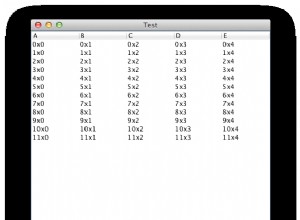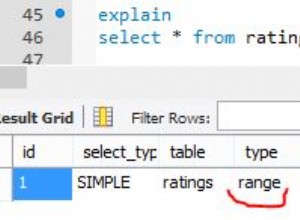Cóż, jestem w stanie to powtórzyć, a powodem takiego zachowania jest interpretacja predykatów przez Oracle.
Wersja systemu operacyjnego i Oracle, w której można to odtworzyć:
SQL> host ver
Microsoft Windows [Version 6.1.7601]
SQL> select * from v$version;
BANNER
--------------------------------------------------------------------------------
Oracle Database 11g Enterprise Edition Release 11.2.0.1.0 - 64bit Production
PL/SQL Release 11.2.0.1.0 - Production
CORE 11.2.0.1.0 Production
TNS for 64-bit Windows: Version 11.2.0.1.0 - Production
NLSRTL Version 11.2.0.1.0 - Production
SQL>
W pierwszym przypadku predykat jest modyfikowany do filter("D"."DT" IS NOT NULL) podczas gdy w drugim zapytaniu predykat działa zgodnie z podanym filter("D"."DT"<TO_DATE(' 2013-01-20 00:00:00', 'syyyy-mm-dd hh24:mi:ss') OR "D"."DT">example@sqldat.com!)
SQL> select count(*)
2 from aaa d
3 where (d.dt > sysdate)
4 or d.dt < to_date('20130120','yyyymmdd')
5 /
COUNT(*)
----------
15
Execution Plan
----------------------------------------------------------
Plan hash value: 977873394
---------------------------------------------------------------------------
| Id | Operation | Name | Rows | Bytes | Cost (%CPU)| Time |
---------------------------------------------------------------------------
| 0 | SELECT STATEMENT | | 1 | 9 | 3 (0)| 00:00:01 |
| 1 | SORT AGGREGATE | | 1 | 9 | | |
|* 2 | TABLE ACCESS FULL| AAA | 15 | 135 | 3 (0)| 00:00:01 |
---------------------------------------------------------------------------
Predicate Information (identified by operation id):
---------------------------------------------------
2 - filter("D"."DT" IS NOT NULL)
Note
-----
- dynamic sampling used for this statement (level=2)
Statistics
----------------------------------------------------------
4 recursive calls
0 db block gets
15 consistent gets
0 physical reads
0 redo size
346 bytes sent via SQL*Net to client
364 bytes received via SQL*Net from client
2 SQL*Net roundtrips to/from client
0 sorts (memory)
0 sorts (disk)
1 rows processed
SQL> ed
Wrote file afiedt.buf
1 select count(*)
2 from aaa d
3 where d.dt < to_date('20130120','yyyymmdd')
4* or (d.dt > sysdate)
SQL>
/
COUNT(*)
----------
7
Execution Plan
----------------------------------------------------------
Plan hash value: 977873394
---------------------------------------------------------------------------
| Id | Operation | Name | Rows | Bytes | Cost (%CPU)| Time |
---------------------------------------------------------------------------
| 0 | SELECT STATEMENT | | 1 | 9 | 3 (0)| 00:00:01 |
| 1 | SORT AGGREGATE | | 1 | 9 | | |
|* 2 | TABLE ACCESS FULL| AAA | 7 | 63 | 3 (0)| 00:00:01 |
---------------------------------------------------------------------------
Predicate Information (identified by operation id):
---------------------------------------------------
2 - filter("D"."DT"<TO_DATE(' 2013-01-20 00:00:00', 'syyyy-mm-dd
hh24:mi:ss') OR "D"."DT">example@sqldat.com!)
Note
-----
- dynamic sampling used for this statement (level=2)
Statistics
----------------------------------------------------------
4 recursive calls
0 db block gets
15 consistent gets
0 physical reads
0 redo size
346 bytes sent via SQL*Net to client
364 bytes received via SQL*Net from client
2 SQL*Net roundtrips to/from client
0 sorts (memory)
0 sorts (disk)
1 rows processed
SQL>
Nie mogłem zrozumieć tego zachowania Oracle, całkiem możliwe, że niektórzy eksperci mogą to wyjaśnić.
Ponownie w trzecim przykładzie predykaty są używane poprawnie. filter("D"."DT"<TO_DATE(' 2013-01-20 00:00:00', 'syyyy-mm-dd hh24:mi:ss') OR INTERNAL_FUNCTION("D"."DT")+1>example@sqldat.com!+1)
SQL> ed
Wrote file afiedt.buf
1 select count(*)
2 from aaa d
3 where (d.dt + 1 > sysdate + 1)
4* or d.dt < to_date('20130120','yyyymmdd')
SQL> /
COUNT(*)
----------
7
Execution Plan
----------------------------------------------------------
Plan hash value: 977873394
---------------------------------------------------------------------------
| Id | Operation | Name | Rows | Bytes | Cost (%CPU)| Time |
---------------------------------------------------------------------------
| 0 | SELECT STATEMENT | | 1 | 9 | 3 (0)| 00:00:01 |
| 1 | SORT AGGREGATE | | 1 | 9 | | |
|* 2 | TABLE ACCESS FULL| AAA | 7 | 63 | 3 (0)| 00:00:01 |
---------------------------------------------------------------------------
Predicate Information (identified by operation id):
---------------------------------------------------
2 - filter("D"."DT"<TO_DATE(' 2013-01-20 00:00:00', 'syyyy-mm-dd
hh24:mi:ss') OR INTERNAL_FUNCTION("D"."DT")+1>example@sqldat.com!+1)
Note
-----
- dynamic sampling used for this statement (level=2)
Statistics
----------------------------------------------------------
5 recursive calls
0 db block gets
15 consistent gets
0 physical reads
0 redo size
346 bytes sent via SQL*Net to client
364 bytes received via SQL*Net from client
2 SQL*Net roundtrips to/from client
0 sorts (memory)
0 sorts (disk)
1 rows processed
SQL>
Jest całkiem oczywiste, że tego samego nie można odtworzyć z wersji Oracle 11.2.0.2.0 i 11.2.0.3.0 na serwerach Linux.
Aktualizacja:
Jako Alex Poole wspomniane w komentarzach - "Może to być błąd 9495697," Błędne wyniki mogą zostać zwrócone dla zapytania zawierającego dwa predykaty filtra OR'd w tej samej kolumnie, gdzie druga strona jednego predykatu nie jest stałą czasu kompilacji (np. Jest to powiązanie, sysdate itp.)"




